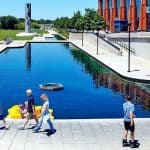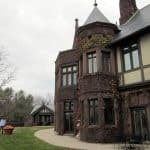A while ago I started to collect city rankings, but more than anything else I was creating the foundation for what would eventually be the greatest destination. If I’ve learned anything throughout this process is that no city can claim such honour. Depending on who you ask, each city will have a unique array of features and advantages that are hard to qualify, let alone compare. But more importantly, the city itself is such a large entity in our mostly urbanized world that trying to generalize any qualities may result in a gross generalization of certain attributes that would be better appreciated if we could localize them.
But since we’re hopelessly lost in this quest for our ideal place, I thought a great place to restart the quest is the latest attempt from Monocle magazine to design the perfect city block. As it seems now a tradition, along with their Quality of Life index, they also look closer and generalize what they’ve learned through the process of ranking cities to put together a theory of “smart urban living”. Without trying to discredit the effort (I really think they are onto something), the article falls to easily into common clichés such as wind turbines, urban farming, community greenhouses, rooftop entertainment and falls short of getting into a serious exploration of the most powerful element to transform our cities: a lively, dense, diverse neighbourhood with progressive minds ready to adapt as new technologies and ideas becoming affordable. In my opinion, more than building we need to explore our cities to find those neighbourhoods that are almost at the brink of a creative explosion, just waiting for the right people to converge and turn them into the ideal urban quarters.
What are the attributes that would make a neighbourhood such a candidate? I expect this will turn into a debate, but here a summary of arguments I’ve put forward over the last three years (in no particular order):
- Hyper-connected: both in the virtual and living realms, it must provide the infrastructure to keep its dwellers engaged with other people across the city and around the globe.
- Sustainable: as with any self-organizing entity, it must optimize resources for its survival, learning to reduce dependency on external sources. This could very well apply to energy efficiency, local food supplies or even its ability to foster the innovation necessary to sustain a thriving culture.
- Evolving: opposing any attempts to characterize the area with a limited number of attributes or features, a great neighbourhood is a living entity with an ongoing narrative that can only be understood by its actors and can only be fully appreciated by being part of such narrative.
- Diverse: not only in the variety of its people, but in its ability to bring these people together into a single meeting point. You should feel like every day is an opportunity to meet a different person from whom you will learn something new.
- Acoustic: as in acoustic medium, where the space becomes a medium that excels at enabling cultural transfer by virtue of the evolved traditions of its participants, advanced mechanisms enabled by technology to propagate information and a rich mix of sources that can be used and reused for many different purposes.
- Unique: even though we may one day discover the perfect recipe for a great neighbourhood, I bet we will continue to be amazed by their variety. A signature lifestyle should be a good hint that you’ve got a good thing going in this place.
- Livable: a great destination should make you feel like you’ve arrived somewhere and not like you’re in transit as an spectator. Its ability for calling on people to settle should be of utmost importance.
How is that for eligibility criteria to become the greatest destination? Can you nominate any area in your city? I’ll continue to explore this theme as we pack our bags and start our Global Culture tour in a quest to find a collection of the best hoods around.








What I don’t like about the idea of an “ideal place” is the fact it always has to be perfect. Green enough, cultural enough, socially advanced enough, secure enough… What I like about cities is the fact they’re just like people, like friends, and, to a certain extent, like relationships; you love a particular city because of its qualities and its imperfections. I like whatever isn’t necessarily working well in a city, I accept Montreal’s, or New York’s, or Paris’ imperfections, and I love them. There is no such thing as a perfect city, but only imperfect cities that are liveable and loveable because of what they are, what they give you, and what they make you feel.
Daviel: you’re absolutely right. I believe travel guides have found elegant ways to convey these imperfections with words such as “charming”, “serene”, “fast-paced” and other adjectives that look to romanticize what the common traveller would likely perceive as faults. And by common I refer to the average tourist content with booking a mass-marketed destination and taken to all the same spots. I believe there is a growing number of sophisticated travellers that will be interested in those imperfections as you call them as they will reveal something new about life. That’s the group I hope to reach out to. I hope the attributes I chose for the greatest destinations are not opposed to that spirit.
Pingback: The greatest destination may be closer than you think. | Indiana Real Estate
Pingback: coyoacán chronicles » Global Culture